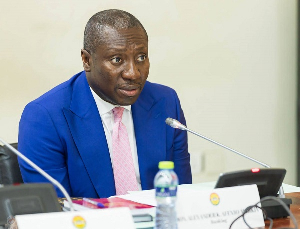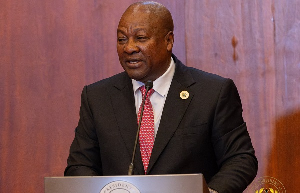The Kufour led-administration implemented 4 out of the proposed 9 modules under the National Youth Employment Programme in the 2nd term of the administration on the heels of promises the NPP made to the youth of Ghana to create “jobs” for them. The NYEP was birthed as a political end to task of job creation that the administration promised even though as of the time, the finance ministry could not find any viable source of raising funds to sustain the entire project. I personally took a trip in 2007 to the Ministry of Youth and Sports to meet the officer in charge (as a student in the University of Ghana and a candidate in the SRC General elections) to inquire more about the programme and possibly consider ways that students of the Universities on vacation could possibly benefit from the programme.
I left the offices of the Ministry a frustrated young Ghanaian upon realization that the programme and its modules exempted tertiary students but was only designed as a stop gap measure to the rescue of those who drop out of the senior high and junior high schools which is rather misplaced and highly discriminatory. He explained that the modules were 9 in total and government was determined to roll out the modules as soon as a 1 trillion cedis funding they were expecting from some donors touches the thresholds of the Osu castle. The money, I believe, finally came and the programme was rolled out. As of today the only 4 of these modules are viable. They include;NYEP Teaching Assistants,NYEP Traffic Wardens,NYEP Hospital Assistants and the NYE/ Zoomlion Sanitation Programme.
I was part of a research team commissioned by one of the German sponsored donor agencies in Ghana to collect data on the National Youth Employment Programme and the exercise revealed some disturbing truths that are worth discussing. There was the problem of unpaid salaries( if Ghanaians could remember, the NYEP was heavily indebted to the extent that many of the workers embarked on demonstrations in the early part of 2008 with some laying down their tools to the displeasure of government.) Again, it came out that the scheme was making no social security contributions to the accounts of the employees which is criminal and illegal. It also came to light that some unqualified deductions were being made out of their 50 Ghana Cedis monthly allowances to some unknown destination to which they could not complain about.
All these revelations saddled the sitting government with an albatross to find a sustainable means of paying salaries of the many beneficiaries under the NYEP. Propositions as borrowing monies from the GETFUND, raising monies from additional taxes on petroleum products and its political ramifications, or introducing a “talk-time tax” to finance the programme. The late Kwadjo Baah Wiredu as Finance Minister favoured the talk-time tax thus government transferred the albatross to the “talkative” Ghanaian public. At the time, the Committee for Joint Action vehemently opposed the tax but as fate had it under the NPP the government unleashed a potent propaganda machinery to bleach the facts and win the sympathy vote of confidence from the gullible public which we swallowed hook line and sinker. It appeared at the time, the public was very sympathetic to the government and allowed this new tax, never heard of or experienced in Kwame Nkrumah’s Ghana, to take immediate effect. The telecommunication network providers as of the time also raised their voices against the implementation of this new tax system as they will have no choice than to transfer the tax burden to the consumer which indeed is the case today. Mr. Kweku Kwateng, Communications Director of the NPP, argued fiercely that the tax, among other things, was aimed at “lowering tariffs on telecommunications and reducing the prices of imported mobile phone handsets”. An argument that was and is still difficult to vouch for as the reality today makes nonsense of these assertions. I am yet to see the fruition of any of these merits on the Ghanaian ICT market till date years after the tax was introduced.
Like other liabilities and asserts bequeathed the Mills administration, the National Youth Employment programme is under meticulous scrutiny as pledged by the Mills administration with the view of fixing the indiscretions and inconsistencies coupled with the huge deficits and corruption that are weighed down in the programme.
First, the head count as recently commissioned by Mr. Abuga Pele, which is still under way across Ghana is most commendable. This exercise is necessary to ascertain the administrative, accounting and social reality of the Youth Employment Programme. The government and people of Ghana need to know the total number of beneficiaries under the programme for the past years. This is necessary to clear the roll of persons who are still drawing monies under the programme though they have either abandoned the programme due to their disillusionment, dead, or have been deliberately captured on the payroll for obvious reasons.
Second, the headcount will lead to an assessment of the cost and benefits the state stands to gain or lose from the programme. Government will come to terms with what it costs to keep the programme afloat and what it will cost for an expansion and possible implementation of the other modules under the programme. This will give government a better foothold in soliciting additional funding for the smooth implementation of the dormant modules for one day, the managers of the programme will be called upon to account for their stewardship to which I believe Ghanaians will not haunt government as being on a witch-hunting spree as the NPP is doing today. This is grave for government to have a fairer idea as to the quantum of yearly subventions the programme would demand on limited annual government budgets.
Third, an audit into the programme means opening up the programme for government to introduce ancillary policies aimed at bridging the nexus between the present and the future of beneficiaries of the programme who wish to attain greater academic and professional laurels in their areas of practice. There must be the point when, say an NYEP ward assistant, who qualifies for admission into the Nurses Training Institution could be given priority in getting them to be trained by the state to render a more professional service to mother Ghana. A serious move the Coordinator of the NYEP should consider must be a reorientation of the National Youth Employment Programme to encapsulate graduates from our polytechnics and Universities as a passage system between National Service and full time employment. The bitter truth is that many graduates today are still at home in search of competitive jobs enough vacancies exist under the programme that could be temporarily filled in many sectors of the economy especially in promoting rural development. The NYEP could serve multi purposes of absorbing interested graduates from the unemployment bracket and putting their knowledge, skills and dexterity to good use while pursing these graduates still pursue dream jobs rather than these graduates remaining in their chambers, without adding anything to GDP and economic growth, if indeed we are determined to hit the middle-income status we aspire. This consideration means the ability of government to convince graduates to take up these vacancies if possible. There must be enough funds to pay those who will be employed and also there should be other benefits like free medical care, community housing programmes (that tasks district assemblies to provide free accommodation to these persons who are willing to come down under the programme to their communities to help) and to a large extent bursaries for beneficiaries after a number of years to pursue higher education.
These might be novelties that could give better meaning to the National Youth employment Programme under the Atta Mills-led Better Ghana Agenda that will benefit every youth of Ghana irrespective of ones tribe or creed.
The facts remains that as the NYEP stands today, there are inherent anomalies that should be corrected. The programme as of now, it is nothing near that perfect picture and it might not turn into one overnight but of course, it provides the basis for the programme to be transformed into a more economically beneficial and a social transforming one to the youth of Ghana as an income generating venture and a powerful tool for social change and economic growth. To Mr. Abuga Pele and his team at the Ministry working very hard to correct these disturbing intrusions into the NYEP, they should stay focused and do what is right, by getting the right caliber of staff who are loyal to the agenda of government and who are well qualified irrespective of ones political colours to run the show.
We ought to learn serious lessons from the hasty introduction of this National Youth Programme mainly as a political tool while ignoring huge financial liabilities it poses for the nation if not carefully researched, planned and executed as a nation.
I believe in the commitment and dexterity of His Excellency President John Mills and his team of competent public servants to work hard to turn the story around for the suatanance of the National Youth Employment Programme and the National Health Insurance Scheme.
The perfect picture in the NYEP I believe would soon and very soon be painted on the canvass of the government’s better Ghana agenda. God Bless our Homeland Ghana! Felix Mawulolo Amegashie Lix_mawulolo@yahoo.com
Opinions of Friday, 28 August 2009
Columnist: Amegashie, Elolo
NYEP- A Perfect Picture?
Entertainment













